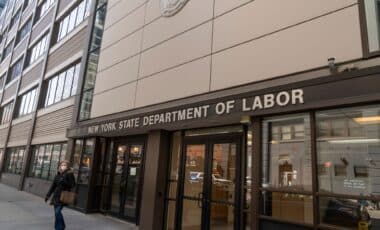Employment opportunities have declined significantly, experiencing a notable 15% drop. This downturn comes amidst a backdrop of escalating borrowing costs and a broader economic recession within the UK.
Employment Opportunities Plummet Amid Economic Uncertainty
The UK job market is experiencing a significant downturn, with job vacancies falling below 900,000 for the first time since April 2021, marking a substantial 15% decline compared to the previous year.
This decline is occurring amid economic uncertainty and a series of 14 consecutive interest rate hikes by the Bank of England. The current high-interest rate environment is placing notable strain on businesses, particularly in terms of increased borrowing costs, which, in turn, tightens financial budgets and diminishes available cash flow.
In such an economic landscape, businesses are confronted with numerous challenges. The escalated cost of borrowing not only impacts existing debt obligations but also restricts access to additional funds for critical initiatives such as expansion and capital investments.
For businesses relying on credit to fuel growth, the elevated interest rates create a more restrictive financial environment, limiting their ability to leverage financial resources effectively.
Navigating Employment Challenges: The Impact of Economic Uncertainty on Hiring Strategies
The heightened cost of borrowing forces companies to reassess their spending priorities. Hiring, being a resource-intensive process, often takes a back seat as businesses prioritize managing debt and ensuring financial stability amidst increased borrowing costs. The prospect of rising costs introduces uncertainty, prompting a reevaluation of long-term commitments and potentially leading companies to adopt a more conservative approach in their workforce expansion strategies.
This cautious approach may result in delayed hiring plans or a more selective recruitment process as businesses navigate the financial challenges posed by prevailing economic conditions.
While the typical timeline for changes in the Bank Rate to permeate through employers’ decision-making processes spans approximately a year, the recent downturn in the job market suggests that the repercussions are already surfacing, manifesting earlier than anticipated.
Andrew Hunter of Adzuna commented on the challenging landscape, stating that January 2024 has proven to be one of the most difficult starts to the year for job hunters. Companies are continuing to put hiring plans on hold, contributing to increased competition for available roles nationwide.
This complex interplay of economic factors underscores the intricate challenges faced by businesses seeking to maintain financial stability and make strategic decisions amidst a dynamic and uncertain economic environment.
The typical timeline for changes in the Bank Rate to permeate through employers’ decision-making processes spans approximately a year. Nevertheless, the recent downturn in the job market suggests that the repercussions are already surfacing, manifesting earlier than anticipated.
Andrew Hunter remarked: “As we predicted last month, January 2024 has proven to be one of the most difficult starts to the year for job hunters in recent years, with companies continuing to put hiring plans on ice.
“This will be disappointing for those hunting for work and only serves to drive up competition nationwide for available roles.”









